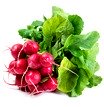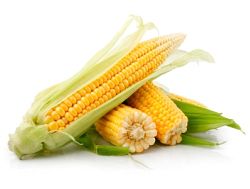A Vegetarian Diet —
Questions and Answers
Wondering how a vegetarian diet
might work for you...or perhaps about how they work in general? Ask
your questions here, and I'll try to provide useful answers that aren't
hopelessly long-winded.

But, first a quick word: vegetarianism isn't really that hard. But it generally does require some forethought and pre-preparation. Otherwise, you could end up eating little more than peanut butter and/or cheese sandwiches and pizza.
True, those are "vegetarian" (if the latter has no meat toppings), but they also contain considerable fat. They also lack many of the riches a broader range of veggies and fruits would provide.
So, although maintaining a vegetarian diet ain't exactly rocket science, you'll need to focus on your menus a bit more than you may be used to. And (she says it again) you'll likely need to do at least some pre-prep.
Have a question yourself? Then, zip over to our Contact Page and give us a shout. Otherwise, check out the questions we've received (or heard) thus far to see if any of them resonate for you:
What do vegetarians eat?
What are some drawbacks to vegetarianism?
What if I don't like cooked tomatoes?
How do I get enough protein on a vegetarian diet?
Managing without meat in "real life"?
Mary: What do vegetarians eat?
Q: Although I think vegetarianism would be something good for me to explore, I can't figure out what I'd eat. Can you give me some ideas?
A:
It's very cool that you asked this question right now, Mary, because we have a page about that very thing [just barely up at the time of her question]. So, instead of regurgitating
it here and annoying the search engines, I'm going to suggest that you
read my answer at the following page: what do vegetarians eat. And thanks for asking that question, because a vegetarian diet can work for many, many people—one of whom might be you!
Jerry: Drawbacks to a vegetarian diet?
Q: Although I'm increasingly drawn to the idea of vegetarianism, I'm wondering about the downsides to eating that way...
A: Well, it's never a bad idea to "look before you leap," and there are some things to watch out for with such a diet: one of those is weight gain from the seeds and nuts you may begin eating too many of and from consuming too many carbs in the form of grains and wheat-based products. It can be pretty easy to do that if you're not paying attention.
But even more critical are the nutritional deficiencies that a careless vegetarian or vegan could develop over time: vitamins B-12 and D, protein, iron, certain minerals, Omega-3 oils, and iodine, among others. You can read more about those at this page. Also, I'd suggest you do plenty of nutritional research on your own; one good place to start is with Living Vegetarian for Dummies. Aside from its title, it's a good and thoughtful read.

Naomi: Doesn’t like cooked tomatoes
Q. I'd really like to eat vegetarian more often, but I’ve got this “issue” with cooked tomatoes. Although
they taste great raw, cooking tomatoes ruins them for me. So when I go
out to an Italian restaurant, for example, what can I eat that’s
vegetarian? And please don’t say fettuccini Alfredo, because cream
sauces make my tongue feel greasy.
A. True, if you can’t stand cooked tomatoes,
an Italian restaurant or a pizzeria could present some challenges. But restaurants tend to be somewhat more
flexible these days, and chefs no longer unanimously freak when guests make reasonable requests.
So,
vegetarians have somewhat more wiggle room now than in the past. For
example, pastas are often tossed with pesto, so perhaps you could
order one of those. If the item contains meat, ask the kitchen to leave
it off. Then discreetly add the dehydrated slivered seitan or coarsely
ground toasted soy nuts nestled in your handbag, you fox.
Or
you could order a dinner salad—even a caprese, if you’re not
vegan, since the tomatoes would be raw. And, remember, desserts are
unlikely to feature tomatoes! Moreover, some desserts actually contain
some
protein: flan or crème caramel, certain mousses, brie and fruit—that
kind of thing. So, with just a little plotting, you could do fine in an
Italian restaurant or bistro. Or even in steakhouses, which sometimes have phenomenal salad bars. (You may not be in Kansas anymore, Dorothy...)
Janet: Worried about getting enough protein
Q. I really want to become vegetarian, but my friends keep telling me I won’t get enough protein. How do I make sure that I do?
A.
First, remember that even veggies contain protein: kale, for example,
contains 2 grams for serving. Which doesn’t sound like a lot, but the
grams do add up over the course of a day. If you eat dairy, you'll get
protein from eggs, milk, and cheese.
Seitan, tempeh, tofu, and other
meat substitutes contain quite a bit of protein as well. And do remember
legumes and grains, both of them also good sources. The secret is to
have these things readily available (planning and organization, right?);
otherwise, you may "default" to seeds and nuts, which could be tough on
your waistline and possibly your gall bladder, as well.
BTW: A
quick way to figure the protein requirement for someone of your
particular size is to divide your weight in half, and then subtract 10.
So, if you weigh around 130 pounds, you should eat roughly 55 grams of
protein, according to this formula. That seems a bit high to me,
frankly, but maybe if you zumba every day, run five miles, or have young
children…
Leila: How to maintain a vegetarian diet in real life
Q. I have a demanding job that sometimes keeps me at my workplace until quite late.
Although I really want to stay with vegetarian eating, I'm finding it
hard under these circumstances. Do you have some suggestions?
A.
Sure do. Take snacks to work with you in a desk-friendly cooler:
yogurt, fruit, and a few nuts make a nice snack, as do hummus and veggie
sticks. For even more "off-site" protein, dehydrate some seitan
and make your own trail mix for work nights. Or take the makings of a
vegetarian sandwich with you from time to time, and assemble it when
you need a quick nosh.
Another possibility: hearty soups that you
take to work in your soup-friendly thermos. How comforting on a late
night to dip into a hot bowl of black bean soup or pasta é fagioi, with
perhaps a few cheese-and-cracker snacks on the side. Or take the
components of a salad, with separate containers for the chopped egg or
tofu, grated cheese, slivered seitan, quinoa...
No need to starve
at work or anywhere else just because you eat a vegetarian diet. With a
little planning and forethought (plus lots of containers and a good
tote bag!) you can eat as well or even better than many omnivores.
Please understand that the material at this site is NOT medical advice, as I am neither doctor nor nutritionist. What I am is merely someone who's lived successfully on a vegetarian diet for many decades...and I transitioned from omnivore to vegetarian gradually. Do check with your doctor, though, if you're considering big changes to your own diet. Also, be sure to find a dependable source of Vitamin B12.
Living Vegetarian the Easy Way
Copyright 2010-2024. Lynda Edwards. All rights reserved.






